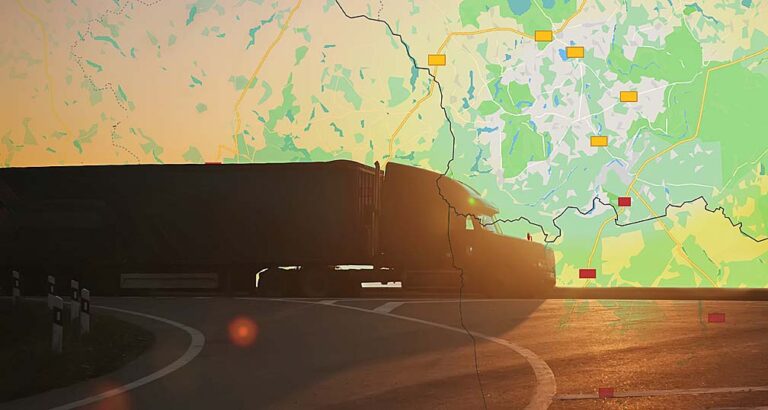WASHINGTON — President Joe Biden on Saturday hailed Congress’ passage of his $1 trillion infrastructure package as a “monumental step forward for the nation” after fractious fellow Democrats resolved a months-long standoff in their ranks to seal the deal
“Finally, infrastructure week,” a beaming Biden told reporters. “I’m so happy to say that: infrastructure week.”
Others, especially in the trucking industry, also heaped praise on the massive spending bill.
Ellen Voie, the president and CEO of the Women In Trucking Association (WIT), said:
“Women In Trucking is ecstatic and grateful for the bipartisan effort that culminated in the passage of an infrastructure bill that will rebuild America’s highways, roads, and bridges. In addition to helping truckers get goods to markets, the bill contains specific provisions to address the shortage of truckers facing the nation.”
Voie added that “as America struggles with logistic issues and a shortage of truck drivers nationwide, the bill will bring more women behind the wheel and protect those who have made truck driving a career. We want to thank Sen. Tammy Baldwin and Rep. Mike Gallagher and others for their leadership on this issue and look forward to this legislation becoming law.”
The House passed the measure 228-206 late Friday, prompting prolonged cheers from the relieved Democratic side of the chamber. Thirteen Republicans, mostly moderates, supported the legislation while six of Democrats’ farthest left members opposed it.
Approval of the bill, which promises to create legions of jobs and improve broadband, water supplies and other public works, sends it to the desk of a president whose approval ratings have dropped and whose nervous party got a cold shoulder from voters in this past week’s off-year elections.
“Roads and bridges are not political—we all drive on them. A majority in the House realized this today and did what’s right for the country, not themselves,” said American Trucking Associations President and CEO Chris Spear.
“From farmers to truckers, the millions of hard-working people who make this country great won today. Those lawmakers who put their constituents before themselves to help seal this achievement have cemented a lasting legacy that the American people will now see, feel, and use for many decades to come.”
The Truckload Carriers Association said in a statement that its members are “excited that this language provides an opportunity to expose a younger demographic to an industry that welcomes them and are pleased with the commitments the bill makes to establishing long-term improvements for infrastructure. Even more importantly, Congress has heard our message concerning threats to the independent contractor business model and opted not to include any language regarding the PRO Act that would have jeopardized a business practice that has a long history of success in our industry.”
The infrastructure package is a historic investment by any measure, one that Biden compares in its breadth to the building of the interstate highway system in the last century or the transcontinental railroad the century before. He called it a “blue collar blueprint to rebuilding America.”
The president’s reference to infrastructure week was a jab at his predecessor, Donald Trump, whose White House declared several times that “infrastructure week” had arrived, only for nothing to happen.
Simply freeing up the infrastructure measure for final congressional approval was like a burst of adrenaline for Democrats. Yet despite the win, Democrats endured a setback when they postponed a vote on a second, even larger bill until later this month.
That 10-year, $1.85 trillion measure bolstering health, family and climate change programs was sidetracked after moderates demanded a cost estimate on the measure from the nonpartisan Congressional Budget Office. The postponement dashed hopes that the day would produce a double-barreled win for Biden with passage of both bills.
But in an evening breakthrough brokered by Biden and House leaders, five moderates agreed to back that bill if the budget office’s estimates are consistent with preliminary numbers that White House and congressional tax analysts have provided. The agreement, in which lawmakers promised to vote on the social and environment bill by the week of Nov. 15, was a significant step toward a House vote that could ultimately ship it to the Senate.
Elated by the bill’s passage, Biden held forth with reporters for over a half hour Saturday morning, joking that his chances of getting the bill done had been written off multiple times, only for him to be able to salvage it. He said he would wait to hold a signing ceremony until lawmakers — Democrats and Republicans who voted for it — return to Washington after a week’s recess.
The president acknowledged uncertainty surrounding his larger social and environmental spending package, saying “time will tell” whether he can keep popular provisions like universal paid family leave in the final version. He wouldn’t say whether he has private assurances from moderate Democrats in the House and Senate to pass the nearly $2 trillion bill, but said he was “confident” he would get the votes.
Biden predicted Americans would begin to feel the impact of the infrastructure bill “probably starting within the next two to three months as we get shovels in the ground.” But the full impact will probably take decades to be fully realized.
He added that he would visit some ports that would benefit from the legislation in the next week, as his administration tries frantically to ease supply chain disruptions that are raising prices on consumer goods before the holidays.
Transportation Secretary Pete Buttigieg said there’s a pent-up demand to get going on public works. He told CNN he’s already got $10 billion worth of applications for a certain program that’s only got $1 billion in it. “This is not just a short term stimulus bill.”
Biden said the investment would be viewed in 50 years as “When America decided to win the competition of the 21st century” with a rising China.
The president and first lady Jill Biden delayed plans to travel Friday evening to their house in Rehoboth Beach, Delaware. Instead, Biden spoke to House leaders, moderates and progressives.
Rep. Pramila Jayapal, D-Wash., leader of the Congressional Progressive Caucus, said Biden even called her mother in India, though it was unclear why
“This was not to bribe me — this is when it was all done,” Jayapal told reporters. The lawmaker said her mother told her she “just kept screaming like a little girl.”
In a statement, five moderates said that if the fiscal estimates on the social and environment bill raise problems, “we remain committed to working to resolve any discrepancies” to pass it.
In exchange, liberals agreed to back the infrastructure measure, which they’d spent months holding hostage in an effort to press moderates to back the larger bill.
The day marked a rare agreement between Democrats’ moderate and liberal wings that party leaders hope will continue. The rival factions had spent weeks accusing each other of jeopardizing Biden’s and the party’s success by overplaying their hands. But Friday night, Jayapal suggested they would work together moving forward.
Democrats have struggled for months to take advantage of their control of the White House and Congress by advancing their priorities. That’s been hard, in part because of Democrats’ slender majorities and bitter internal divisions.
“Welcome to my world,” House Speaker Nancy Pelosi told reporters. “We are not a lockstep party.”
Democrats’ day turned tumultuous early after a half-dozen moderates demanded the budget office’s cost estimate of the sprawling package of health, education, family and climate change initiatives before they would vote for it.
Party leaders said that would take days or more. But with Friday’s delayed vote and lawmakers leaving for a week’s break, those budget estimates should be ready by the time a vote is held.
The infrastructure measure cleared the Senate in August with bipartisan support.
As for the social and environment package, House passage would send it to the Senate, where it faces certain changes and more Democratic drama. That’s chiefly because of demands by Sens. Joe Manchin of West Virginia and Kyrsten Sinema of Arizona to contain the measure’s costs.
Moderates have forced leaders to slash the roughly 2,100-page measure to about half its original $3.5 trillion size. Republicans oppose it as too expensive and damaging to the economy.
The package would provide large numbers of Americans with assistance to pay for health care, raising children and caring for elderly people at home. It’s got $555 billion in tax breaks for cleaner energy and electric vehicles. Democrats added recent provisions restoring a new paid family leave program and work permits for millions of immigrants.
Much of the package’s cost would be covered with higher taxes on wealthier Americans and large corporations.
“The strength of a country’s economy depends on the strength of its infrastructure, and with today’s vote, we have ensured that the American economy will remain strong for decades to come,” Secretary of the Treasury Janet L. Yellen said in a statement.
“A once-in-a-generation infrastructure bill has been an ambition of policymakers for a long time. Its passage is an enormous achievement for our country. By modernizing public transit, rebuilding our bridges and roads, and connecting every home in the country with broadband, this bill will grow our economy and make it more resilient and sustainable in the process.”
The Associated Press contributed to this report.
The Trucker News Staff produces engaging content for not only TheTrucker.com, but also The Trucker Newspaper, which has been serving the trucking industry for more than 30 years. With a focus on drivers, the Trucker News Staff aims to provide relevant, objective content pertaining to the trucking segment of the transportation industry. The Trucker News Staff is based in Little Rock, Arkansas.








